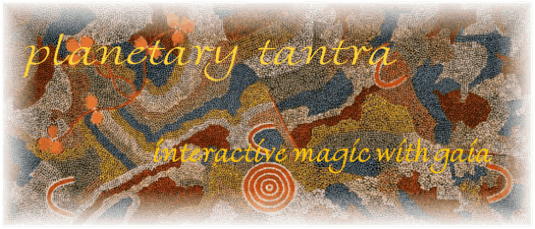| Site Guide |
| Tantra Tour |
| Gaian Tantra Vow |
| Foundations |
| SHAKTI CLUSTER | Dakini Calendar |
| Terma | Sierra de Libar |
* * * * * * * *
F O U N D A T I O N S
* * * * * * * *
NOTE: In table of contents below, the 12 essays in the two categories BASICS and PRACTICE provide approaches to Planetary Tantra. They set out the framework and foundations of interactive magic with Gaia. There is no "PT for Idiots." This is non-gradual path where you enter the practice at deep complexity and involvement, you do not progress to get there. These essays are dense and complex, loaded with references to Sanskrit and Tibetan Tantricism. But behind the Hindu/Buddhist trappings looms a great mystery, an open experiment in desire and imagination.
For a complete descriptive list of texts in PT on this site, see Tantra Tour. For the first plunge, see Introducing Planetary Tantra
B A S I C S
1 Gaia Awakening: Invitation to Planetary Tantra announces that "Gaia, the living earth, is having a lucid dream.
She is not awakening from sleep, she is waking in her sleep." This essay sets out the key points of orientation to PT, including its historical origins in the oral-only teaching given by the Buddha Shakyamuni, contrary to the teachings he gave to the word at large. It includes my apologia as the first self-identified participant in PT, and my place in the nine generations of Kali Yuga, 3102 BCE - 2215 CE.
2 The Tantric Conversion I: From Sophia to the Shakti Cluster describes the challange I faced upon the publication of my book, Not in His Image in November 2006: namely, how to advance and enhance the Sophianic vision of the Mysteries, going beyond the Gnostic materials. This I do by converting the Greek SOPHIA into the Sanskrit VIDYA: both words mean wisdom. Due to the impoverished language of the Coptic sources, it is impossible to bring the fantastic sophistication of Gnosticism into modern expression. But this conversion allows me to draw upon Hindu and Tibetan teachings on the nature of consciousness, power, and magic, effectively reformulating the ancient science of gnosis in vivid and accessible terms. The Sanskrit equivalents to gnosis are prajna and jnana: the root JNA is the Asian counterpart to GNO. It is the same wisdom, East and West, hence, Planetary Tantra.
3 The Tantric Conversion II: The Shakti Cluster and the Tantric Zodiac explains the Shri Vidya mystique, the precious heart of Hindu (Dravidian) goddess religion. It includes an inventory of some earth goddesses named in Hindu religion. Discussing the self-beheading goddess Chinnamasta, I digress into sky lore on the constellations of the RAM and FISHES. This essay introduces the concept that the real-sky zodiac of 13 constellations can be correlated to the divine feminine power of the Shakti Cluster. This correlation is a primary tool for the practice of PT, especially the ritual of tracking the lunar cycles. It concludes with a reference to the lucid dream of Gaia-Sophia:
The Shakti Cluster is the identity node in the lucid dream of Gaia, the imaginative configuration through which she comes to recognize herself and act deliberately in her waking dream, and through which we, in turn, can participate in her dream.
4 Orientation to Planetary Tantra: Q and A is an incomplete text that covers some aspects of PT, such as hedonism, and the requirements for practice. It also compares PT to traditional yoga. I propose that PT be considered as the yoga of discovery.
5 Dakinis on the Roof: Misconceptions About Planetary Tantra addresses the possible view that PT is "black magic," or some form of "Satanism," whatever that is. It considers the nature of divine wrath in its feminine expression and compares PT to "diety yoga" in Tibetan Tantra. There is a digression on clairaudience to explain subliminal reception to the frequencies broadcast on the organ-like console of the Shakti Cluster. It concludes with a key principle of Kalika goddess worship: "The religious practices of the devotees of Adya Kali are a pleasure to perform" (Mahanirvana Tantra).
6 The Future of Rapture 1: Objections and Resistence to Planetary Tantra. Here I address the question of my delivery of the wisdom treasure (terma) I have discovered. I respond to some objections to the perceived religiosity of my presentation, and counter those concerns with a challenge: How would you realize the utter transparency of your narcissism as a test of spiritual awakening? This essay is rather volatile as it reflects my struggle with what appears to be grandiosity, and consequent flaws in my delivery. It concludes with an important claim: PT is not the only message of planetary shift unfolding right now, but it contains the "integral lode" of transformative potencies inherent to the awakening of the planet itself.
7 The Future of Rapture 2: Planetary Tantra and Religious Dementia lists 13 factors of PT that highlight its original and radical nature. It refutes the idea of a reward system in human morality and suggests that loving the earth is not a means to an end but an end in itself. I argue that those who dedicate themselves to the Divine Feminine in the guides of Gaia and Kali are not like the "saved" of Christian religion, or the "chosen ones" of Judaism. It concludes with some reflections on the relation of Planetary Tantra to Kala Tantra.
For more orientation material, see terma: What is the Terma of Gaia Awakening? and The Terma of Gaia Awakening in Practice.
P R A C T I C E
8 How to Practice Planetary Tantra: Basic Interactive Magic with Gaia. This long essay sets out the framework for practices in Plnaetary Tantra, using the Buddhist legend of King Indrabhuti who was given secret Tantric instructions by the historical Buddha, Shakyamuni. It explains the nature of dakini wisdom as sublime memory of enlightenment in the body and stresses the role of consort yoga on the path of Gaian Tantra. It concludes with the key disclosure (or claim), namely, the Shakti Cluster is a turbulent vortex in the atmosphere of the earth, and it cites scientific evidence of the existence of such a vortex.
9 Dakini Weather: Longchenpa's Scenario with the Herukas opens with references to some books by women Buddhist scholars that I have found useful in the Tantric conversion of Sophianic teachings. This is a long and complex essay on visionary experience with dakinis seen in the sky, as described by a Tibetan tantric master of the 13th Century CE, Longchenpa. It outlines the "correction event" hinted in Gnostic writings on the divine Sophia, the goddess who morphed into the eeart.
10 Heart Drop Medicine: The Shakti Cluster as a Vortex of Gaian Correction The title is an illusion to my mystical realization at the Ronda Moment. This essay describes how I develop the correlation between Gnostic and Buddhist Tantric teachings: for instance, converting the Buddhist trikaya into the language of Gaian Tantra. It concludes with esoteric details about the eighteen-petalled lotus in the upper chest, and the pentagram at the center of the Shakti Cluster.
(For more on the structure and dynamics of the SHAKTI CLUSTER, see entries in that category, linked from the menu tree in the upper left corner of all documents in Planetary Tantra.)
11 Desire in Planetary Tantra: The Standard and Challenge of the Gaian Dakinis sets out the framework of the nine generations (270 years) of the close of Kali Yuga, the cosmic age when the option for liberation through desire becomes uniquely accessible. The essay explains what a planetary terma is, and asserts the single most important factor in interactivity with the divine frequencies of the planetary animal mother, the standard of the Gaian Dakinis:
The Diamond Sky Dakinis hold you to your highest desire, your supreme personal desire, and do not dissociate it from the quest for liberation, but make it the paramount condition for that quest.
It explains the scholarly terms desideristic and liberationist and how both of these factors merge in the Shakti Cluster, and complement each other. It concludes with a quote from the Mahanirvana Tantra (11 Century CE), a rare written text containing some indications of the oral-only transmission of Kala Tantra, the spirituality uniquely fitted to the close of Kali Yuga.
12 Toward the Secret Gathering: Freedom and Desire in the Shakti Cluster This essay lists the components of the Shakti Cluster, the 10 Mahavidyas of Hindu religion, and the 6 Diamond Sky Dakinis of the central pentagram, and two more frequencies.
This concludes the essays linked from this page. Additional categories in Planetary Tantra on metahistory.org:
Shakti Cluster,
Dakini Calendar,
Terma,
Sierra de Libar


